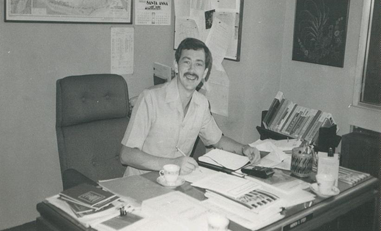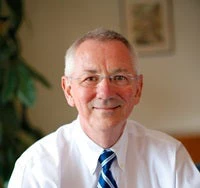
Andrew Steer in Indonesia
Today is my final day at the World Bank.
When I first entered the doors of 1818 H Street three decades and seven Presidents ago, the big buzz in the cafeteria was Cost Benefit Analysis and Basic Needs. President McNamara had demanded that every project document identify in detail how many of the poorest 25% it would directly and indirectly benefit, and how. The secret to rapid career progress was expertise in shadow pricing (which was appropriate in light of the massive distortions in goods, labor, currency and capital markets in most of our client countries).
But those shadow prices certainly didn’t include the value of environmental externalities. The entire cadre of environmental specialists for the whole institution consisted of one person. (It wasn’t me.)
Last week at the Rio+20 Conference I met up with an old friend, Emil Salim, who for many years was the longest serving Environment Minister in the World, and is still, well into his eighties, chief environmental advisor to President Yudhoyono of Indonesia. We reminisced about a meeting he and I were at in 1982, when he asked the President of the World Bank for help in dealing with the acute environmental problems associated with Indonesia’s rapid growth. The polite reply he received was “The World Bank is a development agency, not an environment organization. We don’t do this kind of work.”
How times have changed. On climate change alone, we were currently supporting over 168 countries, with new commitments for mitigation of nearly $8 billion last year. But it hasn’t been a smooth journey, and we’re not yet delivering as much as we need to.
Twenty years ago at the 1992 Rio Earth Summit we were feeling rather pleased with ourselves when we launched the World Development Report on Development and the Environment. For the first time the Bank laid out a clear technical statement on sustainable development. But in the view of many, our actions remained inconsistent with our words, and activists marched on the World Bank booth at the NGO Forum, and burned it down. Some colleagues and I tried to talk them out of it, but to no avail. The majority view was that the Bank was part of the problem, rather than the solution.
Two decades on The Bank Group is widely regarded as a leading player in new ideas and new practices on environmental issues, and many of our closest and most productive partnerships are with environmental groups. At Rio+20 rather than being campaigned against the Bank was in major campaigning mode, urging, cajoling, and building coalitions for stronger action on natural capital accounting, sustainable energy, oceans and inclusive green growth. President Zoellick has insisted that the Bank Group plays a bigger role on biodiversity and wildlife conservation, and in addressing issues of oceans, small island states, energy efficiency, soil carbon etc. He created the post of Special Envoy for Climate Change because he wanted to scale up our financing and bring the world of action into the international dialogue.
So far, so good. But with this capacity and access comes a bigger responsibility.
The context is important. Rio+20 was striking for the failure of inter-governmental negotiations, and the success of smaller coalitions and new initiatives. The agreed text showed no appetite at present – and probably for some time – for strong action agreed at the global level. In this sense the atmosphere was radically different from Rio 92, when a tone of urgency permeated negotiations, and most delegates had a 'can do' spirit. The situation today is, of course, much more, not less, urgent than in 1992. Whether for climate change, water, biodiversity, or urbanization, actions taken in the coming decade will decide whether we succeed or fail for the coming century.
In the absence of global rules, we need to rely on voluntary leadership. There were brilliant examples of such leadership last week in Rio, when big ideas were embraced by coalitions of corporations, governments, communities, city mayors, and philanthropists. But add these all together, and they don’t yet add to anything like the scale required.
The World Bank Group is well-placed to help such coalitions go to scale. This requires identifying and highlighting leadership, helping to remove barriers, reduce risks, facilitate finance, identify best practice, and bring others on board. The WBG’s unique combination of global reach, access to policy-makers, scale of resources, range of instruments, and experience of on-the-ground implementation must be marshaled for this big task.
This won’t happen by itself. The WBG will only live up to its potential if it manages to use its deep skills sets better in combination. For example, the Bank and IFC would both be more effective if they worked more seamlessly together. There’s already been a lot of progress here, but still room for more. Our range of financial instruments, especially those helping public-private initiatives reduce risk, would be more effective if they were used more nimbly and in a more complementary manner. The nature of the coalitions that can be scaled up will also require stronger political and campaigning skills throughout the organization, always combined with the current high quality analytical basis for policy reform. The Bank’s impressive set of 168 country offices, which already generally do a very good job in delivering to their individual country clients will need to act as part of a global network delivering together according to regional and global priorities. Above all, it will require continued very strong activist commitment to these issues by the new President.
My goodness, I will miss my wonderful, imaginative, committed, and inspiring colleagues at the Bank Group, and will treasure many life-changing memories. But I will be just 18 blocks down G Street, watching them, and building even stronger alliances between the great (albeit smaller) institution I am going to, and the great one I am leaving.
Andrew Steer - Special Envoy for Climate Change, World Bank Group
Incoming President, World Resources Institute.
Email: asteer@wri.org


Join the Conversation